30 Sep 2015 | mobile, News, United Kingdom
|

Battle of Ideas 2015
A weekend of thought-provoking public debate taking place on 17 & 18 October at the Barbican Centre. Join the main debates or satellite events.
5 Oct
Does free expression have its limits?
Join Index on Censorship magazine editor Rachael Jolley for a Battle of Ideas satellite event to debate the limits of free expression. With Dr Wendy Earle, Anshuman Mondal, Kunle Olulode and Tom Slater.
When: Monday 5th October, 7-8:30pm
Where: Nunnery Gallery, Bow Arts Trust, 181 Bow Rd, London E3 2SJ
Tickets: £4.89 through Eventbrite
• Full details
17 Oct
Artistic expression: where should we draw the line?
Join Manick Govinda, Index on Censorship CEO Jodie Ginsberg, Cressida Brown, Nadia Latif, Nikola Matisic with chair Claire Fox at the Battle of Ideas festival.
When: 17 October, 4-5:15pm
Where: Cinema 2, Barbican, London
Tickets: Available from the Battle of Ideas
• Full details |
It’s just over a year ago since a mob of anti-racist activists closed down South African theatre director Brett Bailey’s tableaux vivants work Exhibit B in London. The work had actors depicting the horrors of historical slavery, and colonial racism as museum exhibits, echoing the human zoo exhibits of 19th century, which still took place right up until the 1950s.
The work was powerful, visceral, steeped in humanity and stirred a powerful emotional response in the spectator. Yet, it seemed that this physical artistic expression was a step too far for many on the left and Britain’s black community. Most of them, and the 23,000 who signed the petition calling for the Barbican to shut down the work, hadn’t seen the performance. Instead, they felt triggered by a series of publicity photographs of actors performing actions of enslavement and of human bondage.
An image of a semi-naked black woman, sitting, waiting on a bed with her back to the camera, and the reflection of her face and eyes looking back at the viewer, composed and calm was uncomfortable viewing. The living tableau, entitled A Place in the Sun, colonial exhibit, Paris, 1920s was based on a factual account of a French colonial officer who kept a black woman chained to his bed, exchanging food for sexual services. This took place during the French, Belgian and Portuguese scramble for rubber in the Congo. It is a difficult image, the performance brought home the tenderness and active being of the captive woman and stirred emotions of both anger and sadness, as did all the tableaux which took us right to the present day, depicting deported refugee individuals who were killed by the hands hired immigration border security forces. It is hard to disagree with the Brett Bailey’s sincerity that the work is a hard-hitting indictment against racism.
Yet, for the protesters Exhibit B was “an exhibition by a privileged white man who benefited from the oppression of African people in the country [South Africa] in which he grew up, which objectifies black people for a white audience.”
At the opening night in London, 200 angry protesters, with the assistance of the British police force, successfully censored the work. Exhibit B will probably never be performed in England for the foreseeable future.
In the past, artistic, particularly literary works such as DH Lawrence’s Lady Chatterley’s Lover, Vladimir Nabokov’s Lolita, James Joyce’s Ulysses to name a few were banned by state officials and enforced by draconian laws such as the Obscene Publications Act 1959. However, recent censorship of artistic expression is no longer the domain of the state and its officials. It is now curbed by radical activists and also by curators and arts professionals who feel too morally weak to defend and stand by controversial works of art. The police are now called in for their advice on artistic expression and inevitably, in the name of ‘public safety’ works of art are censored from the public.
Only recently we witnessed the censorship of a witty series of satirical photographs by an anonymous artist called Mimsy (sorry Banksy, you’ve been up-staged) depicting the popular children models of Sylvanians (cute furry creatures that akin to those in Beatrix Potter’s tales) innocently enjoying leisurely pursuits such as family picnics, sun-bathing on a beach, having a few pints or just simply watching TV where they are threatened by masked, armed creatures in black uniform called MICE-IS “a fundamentalist terror group [threatening] to annihilate every species that does not submit to their hardline version of sharia law”. However, this wasn’t taken down due to any law being contravened. The work, pulled from an exhibition at the Mall Galleries in London entitled Passion for Freedom (oh the irony) was a result of the gallery managers asking advice from the police as they felt uncomfortable with the “potentially inflammatory content of Mimsy’s work”. The police agreed that the work was inflammatory and couldn’t guarantee the safety of the gallery or visitors, therefore £36,000 would have to be paid to the police force for security cover.
Censorship by fear of terror, by mob-rule, by “triggering’ traumatic feelings, the growing self-censorship of artistic works and the British state’s lily-livered position in defending free expression come into arbitrary play, leading to a worrying situation where potentially any work of art can be censored.
It’s easy to morally grandstand and point the finger at the horrific killings of cartoonists and bloggers in Bangladesh and Iran and criticise the Chinese authorities for their ‘house imprisonment’of Ai Weiwei, but if we cannot defend all forms of artistic expression from the high arts to popular culture, we are seriously compromising artistic freedom for fear of upsetting various communities of interests, be they Muslims, feminists or anti-racists.
I am currently reading Azar Nafisi’s brilliant latest book, Republic of Imagination (2014) where she writes a chapter on the US writer Mark Twain’s 1884 novel Huckleberry Finn as a major inspiration in her life and moral outlook. The novel is currently triggering some US literary students and professors into a state of apoplectic trauma as the word ‘nigger’ is used 219 times in the novel. The decision to re-publish the novel and replace the word ‘nigger’ with ‘slave’ is a dangerous re-writing of history and art. Nafisi defends artistic expression unreservedly and quotes from one of Twain’s notebooks as follows:
“Expression – expression is the thing – in art. I do not care what it expresses, and I cannot tell, generally, but expression is what I worship, it is what I glory in, with all my impetuous nature.” (Republic of Imagination, p.88)
Art should be dangerous, unsettling, funny, an emotional journey, beautiful, entertaining and yes, obscene. Artistic expression, in all its manifestations, is a value that must be defended in our Western democracies. We should heed Mark Twain’s wise words.
Manick Govinda is head of artists’ advisory services for ArtsAdmin
Govinda is participating in the 17 Oct Artistic expression: where should we draw the line?Battle of Ideas session with Index on Censorship CEO Jodie Ginsberg, Cressida Brown, Nadia Latif, Nikola Matisic with chair Claire Fox at the Battle of Ideas festival.
Index on Censorship magazine editor Rachael Jolley is speaking at Does artistic expression have its limits? at the Bow Arts Trust on Monday 05 October
16 Sep 2015 | Magazine, Volume 44.03 Autumn 2015
In conjunction with the Cambridge Festival of Ideas 2015, we will be publishing a series of articles that complement many of the upcoming debates and discussions. We are offering these articles from Index on Censorship magazine for free (normally they are held within our paid-for archive) as part of our partnership with the festival.
Index on Censorship is a global quarterly magazine with reporters and contributing editors around the world. Founded in 1972, it promotes and defends the right to freedom of expression.
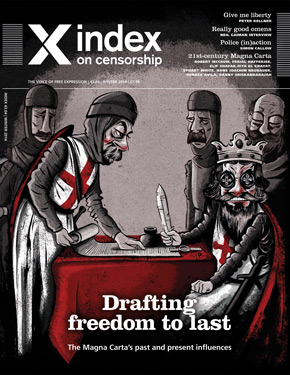
From the winter 2014 issue of Index on Censorship magazine. Subscribe.
“Free thinking” for those who plan to attend the Elections – live! session at the festival this year.
Thoughts policed
Have we created a media culture where politicians fear voicing an opinion that’s not the party line? Max Wind-Cowie reports
We are often, rightly, concerned about our politicians censoring us. The power of the state, combined with the obvious temptation to quiet criticism, is a constant threat to our freedom to speak. It’s important we watch our rulers closely and are alert to their machinations when it comes to our right to ridicule, attack and examine them. But here in the West, where, with the best will in the world, our politicians are somewhat lacking in the iron rod of tyranny most of the time, I’m beginning to wonder whether we may not have turned the tables on our politicians to the detriment of public discourse.
Read the full article
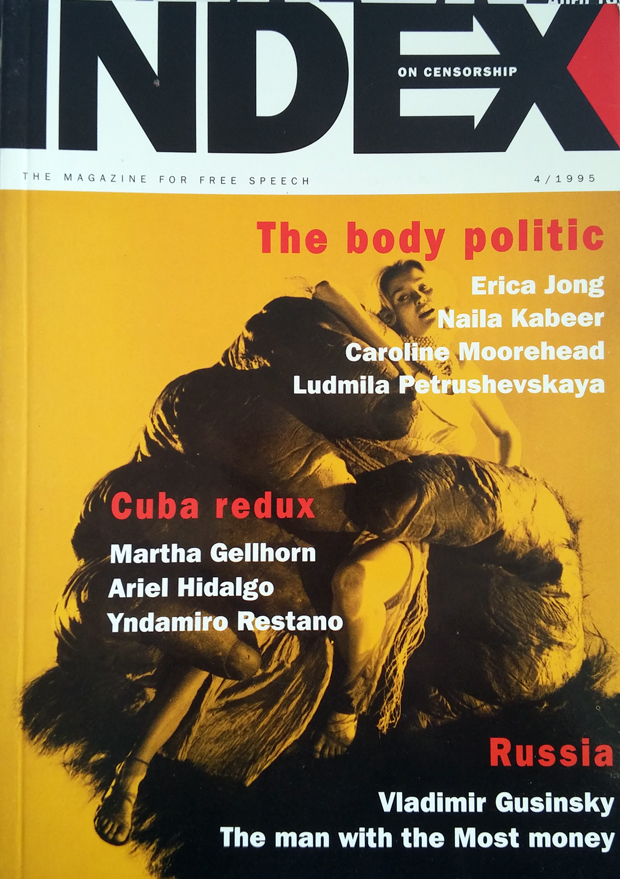
From the summer 1995 issue of Index on Censorship magazine. Subscribe.
“Free thinking” for those who plan to attend the The body politic: censorship and the female body session at the festival this year.
Deliberately lewd
Erica Jong explains why pornography is to art as prudery is to the censors
Pornographic material has been present in the art and literature of every society in every historical period. What has changed from epoch to epoch – or even from one decade to another – is the ability of such material to flourish publicly and to be distributed legally. After nearly 100 years of agitating for freedom to publish, we find that the enemies of freedom have multiplied, rather than diminished.
Read the full article
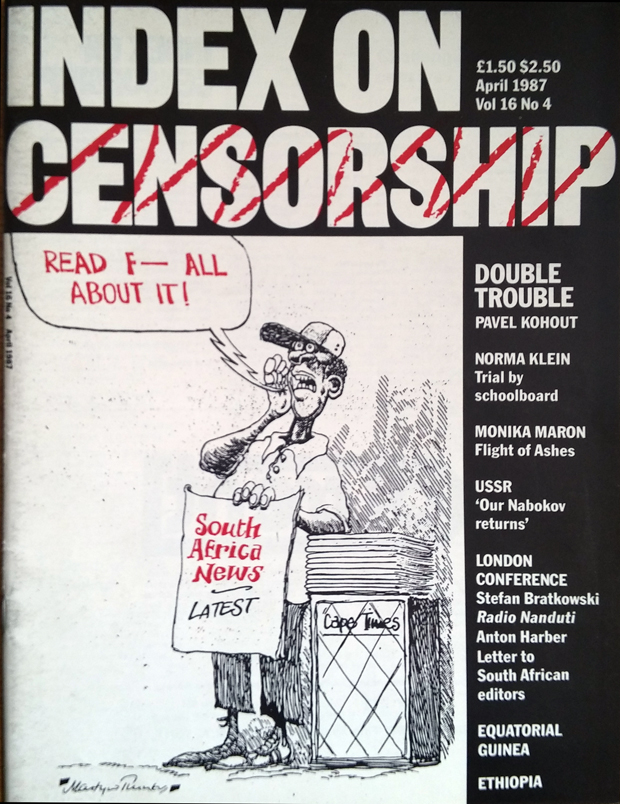
From the spring 1987 issue of Index on Censorship magazine. Subscribe.
“Free thinking” for those who plan to attend the Banned books: controversy between the covers session at the festival this year.
My book and the school library
Norma Klein, the American writer of children’s books, describes how she successfully defended her Confessions of an Only Child before a school board meeting
I used to feel distinguished, almost honoured, when my young books were singled out to be censored. Now, alas, censorship has become so common in the children’s book field in America that almost no one is left unscathed.
Read the full article

From the summer 2014 issue of Index on Censorship magazine. Subscribe.
“Free thinking” for those who plan to attend the Privacy in the digital age session at the festival this year.
Future imperfect
Should concerns about privacy after the NSA revelations change the way we use the web? Jason DaPonte asks the experts about state spying, corporate control and what we can do to protect ourselves
“Government may portray itself as the protector of privacy, but it’s the worst enemy of privacy and that’s borne out by the NSA revelations,” web and privacy guru Jeff Jarvis tells Index.
Read the full article
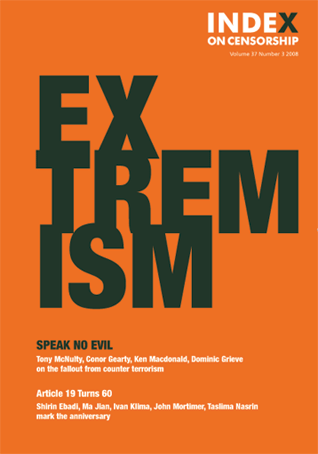
From the summer 2008 issue of Index on Censorship magazine. Subscribe.
“Free thinking” for those who plan to attend the Can writers and artists ever be terrorists? session at the festival this year.
The politics of terror
In the drive to tackle extremism, debate is being undermined and fear is driving the agenda. Conor Gearty makes the case for common sense.
I object to the ‘age of terror’ title. My anxiety about this is that it is already putting people like me at a disadvantage. I am forced to work within an assumption, which is shared by all normal, sensible people, that we live in ‘an age of terror’. Therefore the point of view that I am about to put – about the total appropriateness of the criminal law; about the relative security in which we live; about the fact of our being pretty secure in comparison with many previous generations – is deemed to be sort of eccentric, if not obstructive.
Read the full article
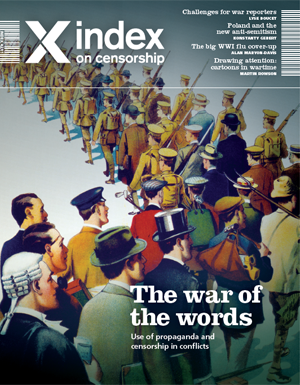
From the spring 2014 issue of Index on Censorship magazine. Subscribe.
“Free thinking” for those who plan to attend the War, Censorship and Propaganda: Does It Work session at the festival this year.
Drawing out the dark side
When it comes to depicting war, humour can be a critic’s most dangerous weapon, says Martin Rowson as he trips through the history of cartoons.
As a political cartoonist, whenever I’m criticised for my work being unrelentingly negative, I usually point my accusers towards several eternal truths. One is that cartoons, along with all other jokes, are by their nature knocking copy. It’s the negativity that makes them funny, because, at the heart of things, funny is how we cope with the bad – or negative – stuff.
Read the full article
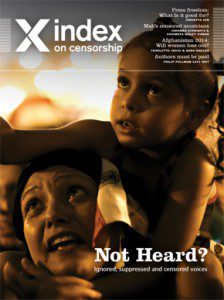
From the autumn 2013 issue of Index on Censorship magazine. Subscribe.
“Free thinking” for those planning to attend the Hidden Voices; Censorship Through Omission session at the festival.
Moving towards inequality
In China, as hundreds of millions leave the countryside to seek employment in the cities, they are left without official jobs, legal protection or school places for their children. Jemimah Steinfeld and Hannah Leung report
When Liang Hong returned to her hometown of Liangzhuang, Henan province, in 2011, she was instantly struck by how many of the villagers had left, finding work in cities all across China. It was then that she decided to chronicle the story of rural migrants. During the next two years she visited over 10 cities, including Beijing, and interviewed around 340 people.
Read the full article
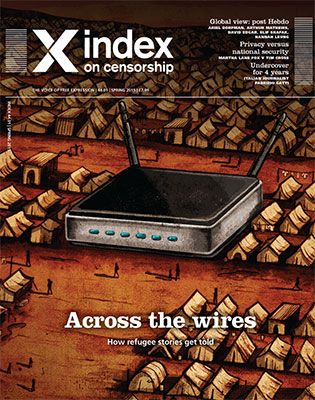
From the spring 2015 issue of Index on Censorship magazine. Subscribe.
“Free thinking” for those planning to attend the A New Home: Asylum, Immigration and Exile in Today’s Britain session at the festival.
Escape from Eritrea
As refugees flee one of the world’s most repressive and secretive regimes, Ismail Einashe talks to Eritreans who have reached the UK but who still worry about the risks of speaking out
Television journalist Temesghen Debesai had waited years for an opportunity to make his escape, so when the Eritrean ministry of information sent him on a journalism training course in Bahrain.
Read the full article

From the autumn 2014 issue of Index on Censorship magazine. Subscribe.
“Free thinking” for those planning to attend the Technologies of revolution: how innovations are undermining regimes everywhere session at the festival.
From drones to floating smartphones: how technology is helping African journalists investigate
Data journalist Raymond Joseph reports on how low-cost technology is helping African newsrooms get hold of information that they couldn’t previously track
Deep in Mpumalanga province, in the far north-east of South Africa, a poorly resourced newspaper is using a combination of high and low tech solutions to make a difference in the lives of the communities it serves.
Read the full article
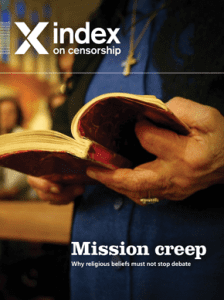
From the winter 2013 issue of Index on Censorship. Subscribe.
“Free thinking” for those planning to attend the Faith and education: an uneasy partnership session at the festival.
Defending the right to be offended
For Index on Censorship magazine Samira Ahmed takes a look at 15 years of multiculturalism and how some people’s ideas of it are getting in the way of freedom of expression.
In 1999, the neo-Nazi militant David Copeland planted three nail bombs in London – in Brixton, Brick Lane and Soho – targeting black people, Bangladeshi Muslims and gays and lesbians. Three people died and scores were injured.
Read the full article
Free Thinking! A unique partnership in 2015, Cambridge Festival of Ideas are working with Index on Censorship to offer in-depth articles and follow-up pieces from leading artists, writers and activists on all of our headline events.
• Join us on 24 Oct for Can writers and artists ever be terrorists?
Anti-terror legislation has been used in several countries to effectively gag free speech about sensitive political issues, but can writing or painting be a terrorist act and what role do they play in radicalisation? Join Index on Censorship CEO Jodie Ginsberg at the Cambridge Festival of Ideas to explore the intersection of art and terrorism.
• Join us on 25 Oct for Question Everything at the Cambridge Festival of Ideas
Question Everything is an unconventional, unwieldy and disruptive day of talks, art and ideas featuring a broad range of speakers drawn from popular culture, the arts and academia. Are we in a drought of new options? Start imagining the world anew with a series of provocateurs. Dissent encouraged. Hosted by Index on Censorship CEO Jodie Ginsberg.
Current issue: Spies, secrets and lies

In the latest issue of Index on Censorship magazine Spies, secrets and lies: How yesterday’s and today’s censors compare, we look at nations around the world, from South Korea to Argentina, and discuss if the worst excesses of censorship have passed or whether new techniques and technology make it even more difficult for the public to attain information. Subscribe to the magazine.
|
9 Sep 2015 | Magazine, mobile, Volume 44.03 Autumn 2015
 In the old days governments kept tabs on “intellectuals”, “subversives”, “enemies of the state” and others they didn’t like much by placing policemen in the shadows, across from their homes. These days writers and artists can find government spies inside their computers, reading their emails, and trying to track their movements via use of smart phones and credit cards.
In the old days governments kept tabs on “intellectuals”, “subversives”, “enemies of the state” and others they didn’t like much by placing policemen in the shadows, across from their homes. These days writers and artists can find government spies inside their computers, reading their emails, and trying to track their movements via use of smart phones and credit cards.
Post-Soviet Union, after the fall of the Berlin wall, after the Bosnian war of the 1990s, and after South Africa’s apartheid, the world’s mood was positive. Censorship was out, and freedom was in.
But in the world of the new censors, governments continue to try to keep their critics in check, applying pressure in all its varied forms. Threatening, cajoling and propaganda are on one side of the corridor, while spying and censorship are on the other side at the Ministry of Silence. Old tactics, new techniques.
While advances in technology – the arrival and growth of email, the wider spread of the web, and access to computers – have aided individuals trying to avoid censorship, they have also offered more power to the authorities.
There are some clear examples to suggest that governments are making sure technology is on their side. The Chinese government has just introduced a new national security law to aid closer control of internet use. Virtual private networks have been used by citizens for years as tunnels through the Chinese government’s Great Firewall for years. So it is no wonder that China wanted to close them down, to keep information under control. In the last few months more people in China are finding their VPN is not working.
Meanwhile in South Korea, new legislation means telecommunication companies are forced to put software inside teenagers’ mobile phones to monitor and restrict their access to the internet.
Both these examples suggest that technological advances are giving all the winning censorship cards to the overlords.
But it is not as clear cut as that. People continually find new ways of tunnelling through firewalls, and getting messages out and in. As new apps are designed, other opportunities arise. For example, Telegram is an app, that allows the user to put a timer on each message, after which it detonates and disappears. New auto-encrypted email services, such as Mailpile, look set to take off. Now geeks among you may argue that they’ll be a record somewhere, but each advance is a way of making it more difficult to be intercepted. With more than six billion people now using mobile phones around the world, it should be easier than ever before to get the word out in some form, in some way.
When Writers and Scholars International, the parent group to Index, was formed in 1972, its founding committee wrote that it was paradoxical that “attempts to nullify the artist’s vision and to thwart the communication of ideas, appear to increase proportionally with the improvement in the media of communication”.
And so it continues.
When we cast our eyes back to the Soviet Union, when suppression of freedom was part of government normality, we see how it drove its vicious idealism through using subversion acts, sedition acts, and allegations of anti-patriotism, backed up with imprisonment, hard labour, internal deportation and enforced poverty. One of those thousands who suffered was the satirical writer Mikhail Zoshchenko, who was a Russian WWI hero who was later denounced in the Zhdanov decree of 1946. This condemned all artists whose work didn’t slavishly follow government lines. We publish a poetic tribute to Zoshchenko written by Lev Ozerov in this issue. The poem echoes some of the issues faced by writers in Russia today.
And so to Azerbaijan in 2015, a member of the Council of Europe (a body described by one of its founders as “the conscience of Europe”), where writers, artists, thinkers and campaigners are being imprisoned for having the temerity to advocate more freedom, or to articulate ideas that are different from those of their government. And where does Russia sit now? Journalists Helen Womack and Andrei Aliaksandrau write in this issue of new propaganda techniques and their fears that society no longer wants “true” journalism.
Plus ça change
When you compare one period with another, you find it is not as simple as it was bad then, or it is worse now. Methods are different, but the intention is the same. Both old censors and new censors operate in the hope that they can bring more silence. In Soviet times there was a bureau that gave newspapers a stamp of approval. Now in Russia journalists report that self-censorship is one of the greatest threats to the free flow of ideas and information. Others say the public’s appetite for investigative journalism that challenges the authorities has disappeared. Meanwhile Vladimir Putin’s government has introduced bills banning “propaganda” of homosexuality and promoting “extremism” or “harm to children”, which can be applied far and wide to censor articles or art that the government doesn’t like. So far, so familiar.
Censorship and threats to freedom of expression still come in many forms as they did in 1972. Murder and physical violence, as with the killings of bloggers in Bangladesh, tries to frighten other writers, scholars, artists and thinkers into silence, or exile. Imprisonment (for example, the six year and three month sentence of democracy campaigner Rasul Jafarov in Azerbaijan) attempts to enforces silence too. Instilling fear by breaking into individuals’ computers and tracking their movement (as one African writer reports to Index) leaves a frightening signal that the government knows what you do and who you speak with.
Also in this issue, veteran journalist Andrew Graham-Yool looks back at Argentina’s dictatorship of four decades ago, he argues that vicious attacks on journalists’ reputations are becoming more widespread and he identifies numerous threats on the horizon, from corporate control of journalistic stories to the power of the president, Cristina Fernández de Kirchner, to identify journalists as enemies of the state.
Old censors and new censors have more in common than might divide them. Their intentions are the same, they just choose different weapons. Comparisons should make it clear, it remains ever vital to be vigilant for attacks on free expression, because they come from all angles.
Despite this, there is hope. In this issue of the magazine Jamie Bartlett writes of his optimism that when governments push their powers too far, the public pushes back hard, and gains ground once more. Another of our writers Jason DaPonte identifies innovators whose aim is to improve freedom of expression, bringing open-access software and encryption tools to the global public.
Don’t miss our excellent new creative writing, published for the first time in English, including Russian poetry, an extract of a Brazilian play, and a short story from Turkey.
As always the magazine brings you brilliant new writers and writing from around the world. Read on.
© Rachael Jolley
This article is part of the autumn issue of Index on Censorship magazine looking at comparisons between old censors and new censors. Copies can be purchased from Amazon, in some bookshops and online, more information here.
9 Jun 2015 | Academic Freedom, Magazine, Volume 44.02 Summer 2015
[vc_row][vc_column][vc_custom_heading text=”What is the state of academic freedom in 2015? Index on Censorship magazine’s summer 2015 issue takes a global vantage point to explore all the current threats – governmental, economic and social – faced by students, teachers and academics. “][vc_row_inner][vc_column_inner width=”1/2”][vc_column_text]
In the UK and US, offence and extremism are being used to shut down debates, prompting the adoption of “no-platforming” and “trigger-warnings”. In Turkey, an exam question relating to the Kurdish movement led to death threats for one historian. In Ireland, there are concerns over the restraints of corporate-sponsored research. In Mexico, students are being abducted and protests quashed.
[/vc_column_text][/vc_column_inner][vc_column_inner width=”1/2″][vc_single_image image=”66714″ img_size=”full”][/vc_column_inner][/vc_row_inner][vc_column_text]
Plus we have reports on Ukraine, China and Belarus, on how education is expected to toe an official line. Also in this issue: Sir Harold Evans, AC Grayling, Tom Holland and Xinran present their free-speech heroes. Ken Saro-Wiwa Junior introduces a previously unpublished letter from his activist father, 20 years after he was executed by the Nigerian state, and Raymond Joseph reports on the dangers faced by Africa’s environmental journalists today. Comedian Samm Farai Monro, aka Comrade Fatso, looks at the rise of Zimbabwean satire; Matthew Parris interviews former UK attorney general Dominic Grieve; Italian journalist Cristina Marconi speaks to Marina Litvinienko, wife of the murdered KGB agent Alexander; and Konstanty Gebert looks at why the Polish Catholic church is upset by Winnie the Pooh and his non-specific gender.
Our culture section presents exclusive new short stories by exiled writers Hamid Ismailov (Uzbekistan) and Ak Welaspar (Turkmenistan), and poetry by Musa Okwonga and Angolan journalist Rafael Marques de Morais. Plus there’s artwork from Martin Rowson, Bangladeshi cartoonist Tanmoy and Eva Bee, and a cover by Ben Jennings.
[/vc_column_text][/vc_column][/vc_row][vc_row][vc_column][vc_custom_heading text=”SPECIAL REPORT: FIRED, THREATENED AND IMPRISONED” css=”.vc_custom_1483456198790{margin-right: 0px !important;margin-left: 0px !important;border-bottom-width: 1px !important;padding-top: 15px !important;padding-bottom: 15px !important;border-bottom-color: #455560 !important;border-bottom-style: solid !important;}”][vc_column_text]
Is academic freedom being eroded?
Silence on campus – Kaya Genç explores why a Turkish historian received death threats for writing an exam question
Universities under fire in Ukraine’s war – Tatyana Malyarenko unveils how Ukrainian scholars have to prove their patriotism in front of a special committee
Industrious academics – Michael Foley looks at how the commercial pressures on Ireland’s universities and students is narrowing research
Stifling freedom – Mark Frary’s take on 1oo years of attacks on US academic freedom
Ideas under review – Lawyer and journalist Suhrith Parthasarathy looks at how the Indian government interfering with universities’ autonomy. Also Meena Vari asks if India’s most creative artistic minds are being stifled
Girls standing up for education – Three young women from Pakistan, Uganda and Nigeria on why they are fighting for equality in classrooms
Open-door policy – Professor Thomas Docherty examines the threats to free speech in UK universities. Plus the student’s view, via the editor of Cambridge’s The Tab new site
Mexican stand-off – After the abduction of 43 students, Guadalajara-based journalist Duncan Tucker looks at the aftermath and the wider picture
Return of the red guards – Jemimah Steinfeld reports on the risks faced by students and teachers who criticise the government in China
[/vc_column_text][/vc_column][/vc_row][vc_row][vc_column][vc_custom_heading text=”IN FOCUS” css=”.vc_custom_1481731813613{margin-right: 0px !important;margin-left: 0px !important;border-bottom-width: 1px !important;padding-top: 15px !important;padding-bottom: 15px !important;border-bottom-color: #455560 !important;border-bottom-style: solid !important;}”][vc_column_text]
Pride and principles – Matthew Parris in conversation with the former UK attorney general Dominic Grieve
A letter from Ken Saro-Wiwa – A moving tribute from the son of one of the Ogoni nine and a previously unpublished letter from his father who was killed in Nigeria 20 years ago
Hunt and trap – Raymond Joseph reports on the dangers currently being faced by Africa’s environmental journalists
Litvinienko’s legacy – Italian journalist Cristina Marconi speaks to Marina Litvinienko, wife of the murdered KGB agent Alexander
God complex – Konstanty Gebert looks at why the Polish Catholic church is so worried about Winnie the Pooh’s gender
Zuma calls media ‘unpatriotic’ – Professor Anton Harber speaks to Natasha Joseph about the increasing political pressure on South African journalism
Dangers of blogging in Bangladesh – Vicky Baker on the recent murders of Bangladeshi bloggers by fundamentalists, plus a cartoon by Dhaka Tribune’s Tanmoy
Comedy of terrors – Samm Farai Monro, aka Comrade Fatso, on the power of Zimbabwe’s comedians to take on longstanding political taboos
Print under pressure – Miriam Mannak reports on the difficulties facing the media in Botswana, as the president tightens his grip on power
On forgotten free speech heroes – Sir Harold Evans, AC Grayling, Tom Holland and Xinran each pick an individual who has made a telling contribution to free speech today
Head to head – Lawyer Emily Grannis debates with Michael Halpern on whether academic’s emails should be in the public domain
[/vc_column_text][/vc_column][/vc_row][vc_row][vc_column][vc_custom_heading text=”CULTURE” css=”.vc_custom_1481731777861{margin-right: 0px !important;margin-left: 0px !important;border-bottom-width: 1px !important;padding-top: 15px !important;padding-bottom: 15px !important;border-bottom-color: #455560 !important;border-bottom-style: solid !important;}”][vc_column_text]
The pain of exile – Exclusive new fiction from Uzbek writer Hamid Ismailov, who has not only had all his books banned back in his homeland, but every mention of his name
Eye of the storm – A poem by Musa Okwonga on the importance of allowing offensive views to be heard and debated on university campuses
The butterfly effect – The lesser known poetry of Index award-winner Rafael Marques De Morais
Listening to a beating heart – A new short story from Ak Welsapar, an author forced to flee his native Turkmenistan after being declared an enemy of the people
[/vc_column_text][/vc_column][/vc_row][vc_row][vc_column][vc_custom_heading text=”COLUMNS” css=”.vc_custom_1481732124093{margin-right: 0px !important;margin-left: 0px !important;border-bottom-width: 1px !important;padding-top: 15px !important;padding-bottom: 15px !important;border-bottom-color: #455560 !important;border-bottom-style: solid !important;}”][vc_column_text]
Global view – Index’s CEO Jodie Ginsberg on the difficulties of measuring silenced voices
Index around the world – An update on Index’s latest work
[/vc_column_text][/vc_column][/vc_row][vc_row][vc_column][vc_custom_heading text=”END NOTE” css=”.vc_custom_1481880278935{margin-right: 0px !important;margin-left: 0px !important;border-bottom-width: 1px !important;padding-top: 15px !important;padding-bottom: 15px !important;border-bottom-color: #455560 !important;border-bottom-style: solid !important;}”][vc_column_text]
Battle of the bots – Vicky Baker reports on the fake social media accounts trying to silence online protest
[/vc_column_text][/vc_column][/vc_row][vc_row][vc_column][vc_custom_heading text=”SUBSCRIBE” css=”.vc_custom_1481736449684{margin-right: 0px !important;margin-left: 0px !important;border-bottom-width: 1px !important;padding-bottom: 15px !important;border-bottom-color: #455560 !important;border-bottom-style: solid !important;}”][vc_column_text]Index on Censorship magazine was started in 1972 and remains the only global magazine dedicated to free expression. Past contributors include Samuel Beckett, Gabriel García Marquéz, Nadine Gordimer, Arthur Miller, Salman Rushdie, Margaret Atwood, and many more.[/vc_column_text][vc_row_inner][vc_column_inner width=”1/2″][vc_single_image image=”76572″ img_size=”full”][/vc_column_inner][vc_column_inner width=”1/2″][vc_column_text]In print or online. Order a print edition here or take out a digital subscription via Exact Editions.
Copies are also available at the BFI, the Serpentine Gallery, MagCulture, (London), News from Nowhere (Liverpool), Home (Manchester), Calton Books (Glasgow) and on Amazon. Each magazine sale helps Index on Censorship continue its fight for free expression worldwide.
 SUBSCRIBE NOW[/vc_column_text][/vc_column_inner][/vc_row_inner][/vc_column][/vc_row]
SUBSCRIBE NOW[/vc_column_text][/vc_column_inner][/vc_row_inner][/vc_column][/vc_row]













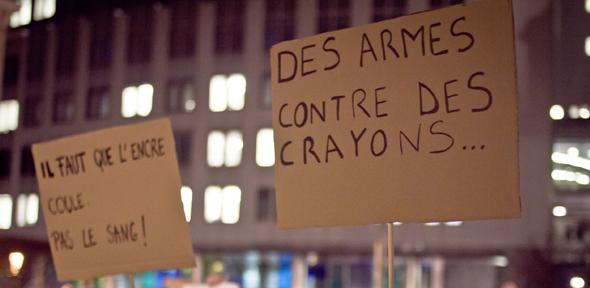


 In the old days governments kept tabs on “intellectuals”, “subversives”, “enemies of the state” and others they didn’t like much by placing policemen in the shadows, across from their homes. These days writers and artists can find government spies inside their computers, reading their emails, and trying to track their movements via use of smart phones and credit cards.
In the old days governments kept tabs on “intellectuals”, “subversives”, “enemies of the state” and others they didn’t like much by placing policemen in the shadows, across from their homes. These days writers and artists can find government spies inside their computers, reading their emails, and trying to track their movements via use of smart phones and credit cards.